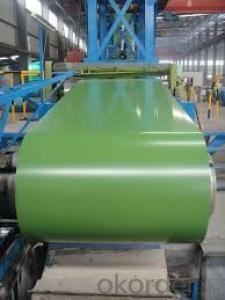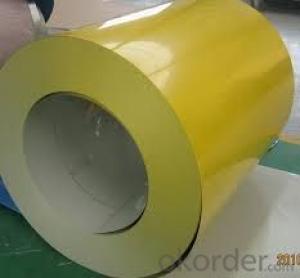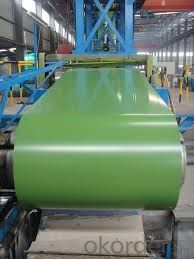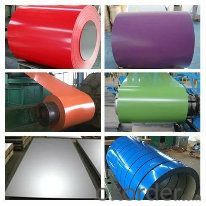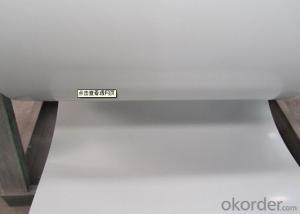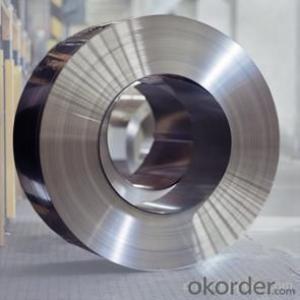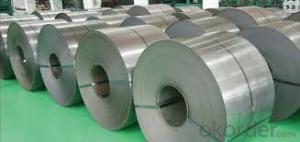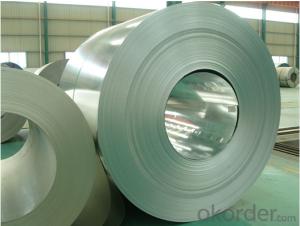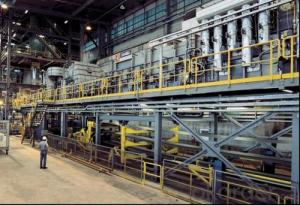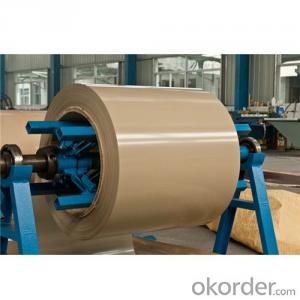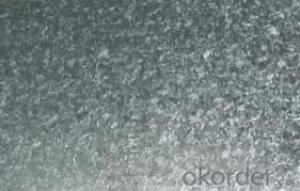Color Steel Rolled/Galvalume Steel Coil/Gl/Zinc Aluminized Steel
- Loading Port:
- Shanghai
- Payment Terms:
- TT OR LC
- Min Order Qty:
- 20 m.t.
- Supply Capability:
- 20000 m.t./month
OKorder Service Pledge
OKorder Financial Service
You Might Also Like
Product Description
Specification:
| Product Name: | Galvalume steel coil/GL/Zinc Aluminized steel |
Standard: | JIS G3302-1998/EN10142/ASTM A653/ASTM A792/ AISI/BS/ DIN/GB |
| Price: | US $600-800 / Metric Ton |
| Trade Terms: | FOB/CNF/CIF |
| Supply Ability: | 30000 Metric Ton monthly |
| Packing: | standard exporting packing or at buyer's requirement |
| Payment Terms: | L/C,T/T |
| Delivery time: | Within 15-30days after we receive deposit or L/C at sight |
| Specifications: | Brand Name :CNBM Thickness:0.14-0.6mm Type:coil/sheet/strips Width:600- 1250mm Length: Zinc Coating:40g-150g/ Coil ID :508mm or 601mm Coil Weight :3-8MT Place of Origin:China Tianjing,shanghai Standard: AISI, ASTM, BS, DIN, GB, JIS Technique:Cold Rolled Surface Treatment:Anti-finger |
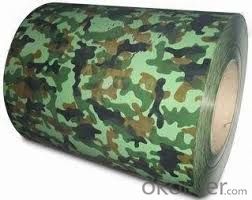
Application
1. Architecture Roofs and outside walls of civilian and industrial buildings, garage doors, fencings and window blinds
2. Appliances Industry Outer clad sheets for washing machine, refrigerator, television, air conditioner and ventilation system, explosion-proof strip, solar water heater and appliance parts
3. Auto Industry Muffler, heat shields of exhaust pipe and catalytic converter, auto parts & accessories under the frame, signboard in highway
4. Industrial Instruments Electric control cabinet, industrial refrigeration equipment, automatic vending machine
Service
1.MOQ:25 ton.
2.Delivery time;15-30days
3.Payment:30% deposite, 70% in L/C before delivery or T/T
4.We can guarantee 100% inspeciton before the shipment
5.We can 100% supply MTC.
Q&A What is your acceptable payment term?
ANSWER: TT,LC,OA etc
- Q: I want to know because I'm going to Hershey Park on Wednesday and Steel Force looks about the same size, so, I wanted to know. It's not that Steel Force is too big for me.
- steel force breaks the 200ft mark and is a steel out and back roller coaster. Tidal force is a water ride that is about 100 ft tall. If you can do Steel Force then you should be able to handle anything at Hersheypark. the on;y ride they have bigger is the Kissing Tower
- Q: How do steel coils contribute to the manufacturing of agricultural machinery?
- Steel coils play a crucial role in the manufacturing of agricultural machinery. These coils are typically made from high-quality steel, which possesses excellent strength, durability, and resistance to corrosion. Firstly, steel coils are used in the fabrication of the main structural components of agricultural machinery, such as the chassis, frames, and supports. These components need to withstand heavy loads, extreme weather conditions, and rough terrains. The strength and resilience of steel coils ensure that the machinery can handle these demanding environments and perform efficiently. Moreover, steel coils are utilized in the production of various moving parts and mechanisms within agricultural machinery. For instance, they are used to create gears, shafts, and axles, which are essential for transmitting power and transforming rotational motion. Steel's high tensile strength and excellent machinability make it an ideal material for these critical components, ensuring their reliability and longevity. Steel coils also contribute to the production of agricultural machinery by providing a protective layer against wear and tear. The coils are often coated with specialized finishes or paints to enhance their resistance to rust, chemicals, and abrasion. This protective layer extends the lifespan of the machinery and reduces the need for frequent maintenance and repairs, ultimately increasing its overall efficiency and productivity. Furthermore, the versatility of steel coils allows for customization and adaptation to meet the specific requirements of agricultural machinery. Manufacturers can shape and form the coils into various sizes and dimensions, enabling the production of machinery suitable for different farming practices and applications. Whether it's tractors, harvesters, or irrigation systems, steel coils are essential in creating versatile and reliable agricultural machinery. In summary, steel coils are indispensable in the manufacturing of agricultural machinery due to their strength, durability, resistance to corrosion, and customization capabilities. From structural components to moving parts and protective coatings, steel coils contribute significantly to the efficiency, reliability, and longevity of agricultural machinery, ultimately supporting the global agricultural industry.
- Q: How are steel coils inspected for surface finish?
- Steel coils are inspected for surface finish through a visual examination process where trained inspectors assess the surface quality, texture, and any potential defects or imperfections. Additionally, specialized equipment such as surface roughness testers and optical profilometers may be used to measure the smoothness, waviness, and other surface parameters.
- Q: How many pounds can steel lift?
- Well, metal steel can lift an infinite amount of weight if necessary, BUT it can only withstand tensile PRESSURE up to a certain amount. That amount depends on what kind of steel you have; you can have low and high carbon steel, for example, here are some maximum tensile forces a lot of common steels can withstand: Coated Steel (Galvanized): 200-215 GPa Terne Coated Stainless Steel: 189 - 197 GPa Terne Coated Steel: 185-200 GPa AirMet100 High alloy steel: 193-203 GPa AF1410: 203 -213 GPa 17% Cobalt Steel: 199-209 GPa 36% Cobalt Steel: 199-209 GPa 6% Tungsten Steel: 218-229 GPa A-286: 201-211 GPa N-115: 201-211 GPa 250 Maraging Steel: 183 - 192 GPa 280 (300) Maraging Steel: 183-192 GPa And that's just Coated and High-alloy steels, I have yet to go through Cast Irons, Commercial-purity Iron, Low alloy steel, low carbon steel, medium alloy steel, medium carbon steel, stainless steels, tool steels, and very low carbon steels, and I'm not even sure if this is a complete list of the different types of steels in the world. TL;DR We need more information. EDIT: By pressure, I mean the negative tensile type of pressure. EDIT 2: At it's thinnest point, most supportive skeletal features will be able to support 132 pounds quite easily. However, if you want to make an effective light-weight strong skeleton, I would suggest using aluminium rather than steel.
- Q: What are the different grades of steel used in manufacturing steel coils?
- The different grades of steel used in manufacturing steel coils include low carbon steel, medium carbon steel, high carbon steel, and stainless steel.
- Q: What are the different methods of surface treatment for steel coils?
- Steel coils can undergo various surface treatment methods, each with its own advantages and uses. Some commonly employed techniques include: 1. Hot-dip galvanizing: Immersing the steel coil in molten zinc results in a protective coating. This process offers excellent corrosion resistance and is commonly employed in outdoor applications like roofing, fencing, and automotive parts. 2. Electro-galvanizing: A thin layer of zinc is electroplated onto the steel coil's surface. Electro-galvanizing provides similar corrosion resistance to hot-dip galvanizing but with a thinner coating. It is often utilized when a smooth and visually appealing finish is desired, such as in appliances, electrical equipment, and automotive components. 3. Powder coating: A dry powder is applied to the steel coil's surface and cured under heat to form a durable and protective layer. This method offers excellent resistance to chipping, scratching, and fading, making it suitable for both indoor and outdoor applications. 4. Painting: Liquid paint coatings can be applied to steel coils, offering both protection and aesthetic appeal. These coatings can be customized to meet specific requirements such as corrosion resistance, UV protection, or chemical resistance. They find common usage in industries like construction, automotive, and appliances. 5. Pickling and oiling: This method involves removing scale or rust from the steel coil's surface by dipping it in an acid solution (pickling), followed by a coating of oil to prevent reoxidation. Pickling and oiling are typically employed for temporary corrosion protection during the storage and transportation of steel coils. 6. Pre-painted coatings: Steel coils can be coated with pre-painted finishes during the manufacturing stage. This continuous process involves passing the steel coil through a coating line where a layer of paint is applied. Pre-painted coatings offer a wide range of colors and finishes, making them popular in industries like construction, automotive, and appliances. These are only a few examples of the surface treatment methods commonly used for steel coils. The selection of a specific technique depends on factors such as desired corrosion resistance, aesthetic preferences, environmental conditions, and specific application requirements.
- Q: What are the common methods of recoiling steel coils?
- The common methods of recoiling steel coils include slitting, rewinding, oscillating, and recoiling using a mandrel or a recoiler machine. Slitting involves cutting the wide coil into smaller widths, while rewinding involves rewinding the coil into a tighter, more compact roll. Oscillating is a method where the coil is wound back and forth to create a narrow, oscillating coil. Finally, recoiling using a mandrel or a recoiler machine involves winding the coil onto a mandrel or a spool to create a new coil of desired size and shape.
- Q: What are the different types of steel grades used for coil production?
- There are various types of steel grades used for coil production, including carbon steel, stainless steel, and high-strength low-alloy (HSLA) steel. These grades are selected based on the specific requirements and application of the coils, such as strength, corrosion resistance, and formability.
- Q: What is the average lead time for receiving replacement steel coils?
- The average lead time for receiving replacement steel coils can vary depending on various factors such as the supplier, location, and specific requirements. It is recommended to contact the supplier directly for an accurate estimation of the lead time.
- Q: i am working a client.my vendor specified in pipe specification pipe line class as MS1 (code for Mild steel)but assigned material to this code is cs smls astm A 106B.my question is any difference between CS and MS material?pls suggest me
- *Carbon steel, also called plain carbon steel or Mild Steel, is steel where the main alloying constituent is carbon. The AISI defines carbon steel as: Steel is considered to be carbon steel when no minimum content is specified or required for chromium, cobalt, columbium, molybdenum, nickel, titanium, tungsten, vanadium or zirconium, or any other element to be added to obtain a desired alloying effect; when the specified minimum for copper does not exceed 0.40 percent; or when the maximum content specified for any of the following elements does not exceed the percentages noted: manganese 1.65, silicon 0.60, copper 0.60. If it crosses limit as said, it will come under alloy steel. ASTM A 106 gr B is a carbon steel pipe and seamless Pipe for High Temperature Service. So, it will be a mild steel comes under carbon steel category.
Send your message to us
Color Steel Rolled/Galvalume Steel Coil/Gl/Zinc Aluminized Steel
- Loading Port:
- Shanghai
- Payment Terms:
- TT OR LC
- Min Order Qty:
- 20 m.t.
- Supply Capability:
- 20000 m.t./month
OKorder Service Pledge
OKorder Financial Service
Similar products
Hot products
Hot Searches
Related keywords
